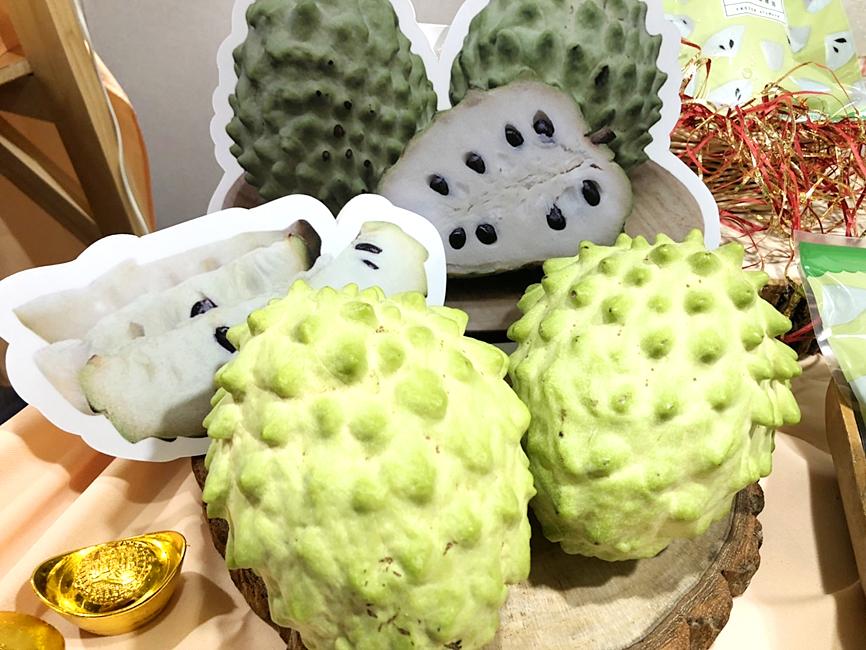-
By Yang Yuan-ting and Kayleigh Madjar / Staff reporter, with staff writer
The Council of Agriculture on Tuesday defended asking public enterprises to purchase pineapple custard apples, after employees complained they were “being forced” to buy the fruit to mitigate the effects of a Chinese ban.
Agriculture and Food Agency Director-General Hu Jong-i (胡忠一) made the comment at an event presenting products made from the fruit for the Lunar New Year, after China in September last year banned the fruit claiming imports contained invasive insects.
Also called atemoya, the fruit are a hybrid between cherimoya and sugar apples, notable for their pale green and bumpy skin.

Photo: Yang Yuan-ting, Taipei Times
The nation exports about 13,000 tonnes of pineapple custard apples each year, primarily to China.
To ease the effects of the Chinese ban, the council last year proposed a three-pronged approach involving domestic sales, foreign promotion and the development of processed atemoya goods.
On Jan. 6, it sent a letter to public and private enterprises encouraging them to help farmers and express their patriotic spirit by buying the fruit.
The council does not have the ability or the authority to force businesses to purchase anything, Hu said on Tuesday, adding that the letter was only meant to encourage businesses to support farmers.
More than 5,000 tonnes of the fruit have been ordered by domestic buyers, while more than 3,000 tonnes have been ordered by manufacturers, he said.
As pineapple custard apples typically fetch high prices when sold fresh and take three to five years to mature, little consideration had previously been given to processing the fruit, the council said.
Researchers and businesses spent two months working to create some of the first products made with pineapple custard apples, including soda and cake, which the council presented at a news conference on Tuesday.
Atemoya are rich in polyphenols, which give it a bitter taste when processed, said Hsieh Chang-wei (謝昌衛), a professor in the Department of Food Science and Biotechnology at National Chung Hsing University.
The flavor can be improved by adding matcha to create a shaved ice dessert or using it to make fermented drinks, he said.
In the case of products such as soda, it also extends the lifespan of the fruit, for at least a year, he added.
This week marks the start of harvest season, with wholesale prices at NT$67.2 per kilogram in Taipei.
Hu said he did not believe that holiday gift boxes of pineapple custard apples would affect sales of more popular seasonal fruits, as torrential rains in August last year reduced production of tangerines and jujubes by about 20 percent.
Comments will be moderated. Keep comments relevant to the article. Remarks containing abusive and obscene language, personal attacks of any kind or promotion will be removed and the user banned. Final decision will be at the discretion of the Taipei Times.
"fruit" - Google News
January 21, 2022 at 11:00PM
https://ift.tt/32j51xM
Council defends plea to buy fruit - Taipei Times
"fruit" - Google News
https://ift.tt/2pWUrc9
https://ift.tt/3aVawBg
Bagikan Berita Ini














0 Response to "Council defends plea to buy fruit - Taipei Times"
Post a Comment